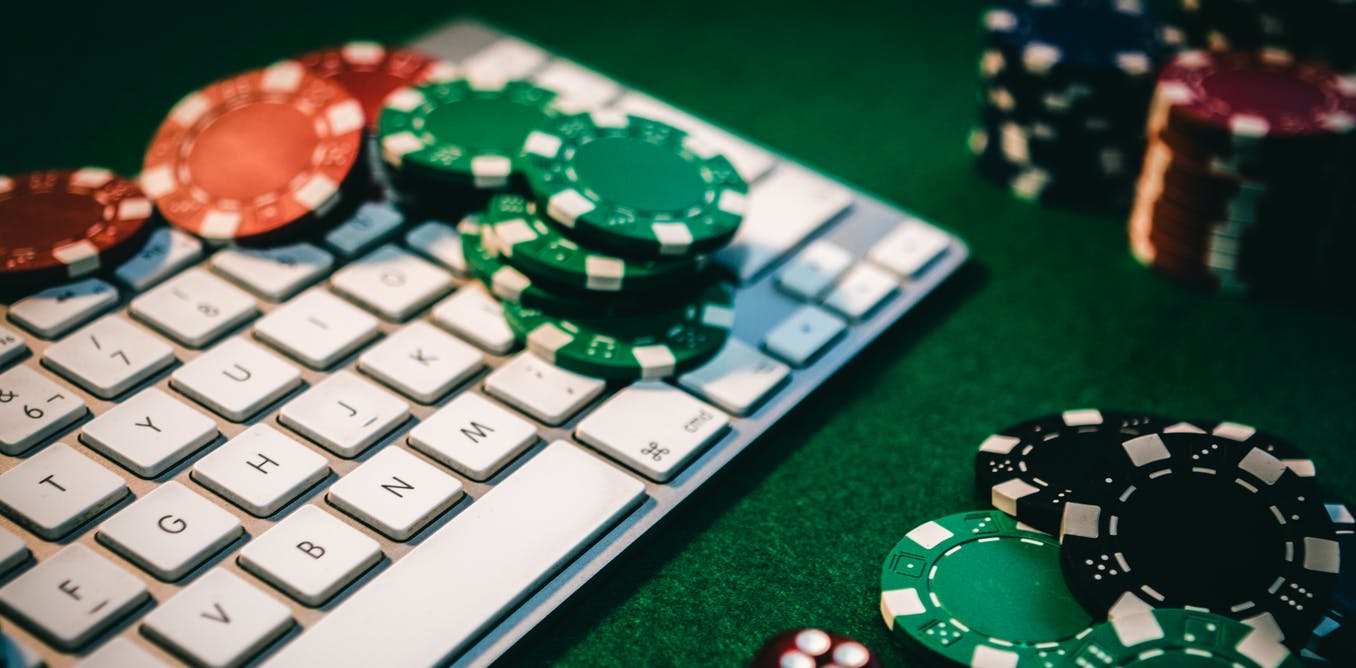How football and COVID-19 are both triggers for a surge in online gambling

Shutterstock/Xavier Lorenzo
Euro 2020 is one of the biggest events in football, a festival of goal scoring and glory seeking – and for many, yet another opportunity to gamble.
Anyone following the action – whether it’s at a stadium, on TV or online – will never be far away from an advert inviting them to place a bet on what may or may not happen next. How about a quick punt on the next player to score or which match will go to penalties?
Many of these suggestions come with the seemingly attractive offer of a free bet, just a click away on your nearest connected device. Sport is now inextricably linked to gambling, and the industry’s major operators have a multi-screen presence designed to make placing bets as easy and convenient as possible.
Our report, published in 2019, showed clear spikes in adverts around matches during the World Cup of 2018, as well as quick links to betting opportunities.
These trends are likely to have been repeated during Euro 2020 – but fuelled this time by new habits formed, as our latest research shows, during the pandemic.
The research, undertaken with participants of the Avon Longitudinal Study of Parents and Children, clearly shows how the first lockdown in England sparked a peak in online gambling among younger adults. And while the reduction in live sport and the closure of betting shops reduced overall gambling, online betting went up sixfold for regular gamblers. This included bingo, poker and casino games.
We found that younger men who gambled regularly were much more likely to go online to gamble during the lockdown than they had been in the past. Respondents who only gambled occasionally were still more than twice as likely than before to gamble online.
Our previous work from 2018 used language analysis computer programmes to estimate the age of Twitter users from publicly available data. We found that young people – including children, who are supposedly barred from gambling by law – avidly followed gambling accounts on Twitter.
They actively engaged with tweets from gambling operators by liking, replying and sharing. This kind of “snowball” advertising – where users (of any age) loop in their friends to gambling content – is almost impossible to control. Currently, there are no specific social media advertising regulations.
With international and domestic football matches – and other sports – in full swing again, we can only expect online gambling to soar. And predictably, it will be vulnerable people who suffer the most.
Our more recent study showed that those who struggled financially before the pandemic were more likely to gamble during lockdown. The research also indicated that drinking heavily (defined as more than six units in a session, roughly equivalent to three pints of beer) at least once a week, was strongly linked to regular gambling among both men and women.
The connection between binge drinking and regular gambling is of particular concern, as they are both addictive and can have serious health and social consequences. With the wider availability of gambling through different online channels, vulnerable groups can get caught in a destructive cycle.
The prevalence of home working is likely to exacerbate this, as the temptation to gamble online, amplified by clever advertising, is always there.
Player power
This kind of advertising will hopefully be addressed in some form later this year, after the UK government’s review of the Gambling Act 2005. One remit of the review is to consider the effects of gambling advertising, acknowledging the link between sport and betting.
Maybe it will work out a way to reflect the view of the public. According to a recent survey almost two-thirds (63%) of adults and over half (53%) of young people support a total ban on adverts for gambling products.
It is unlikely, though, that we will see any major changes in time for the next major footballing event – the World Cup in November 2022. So perhaps we should look to some of football’s big names to make a stand instead.
When Cristiano Ronaldo moved a fizzy drink bottle at the start of a Euro 2020 press conference, he reportedly wiped $US4 billion (£2.84 billion) off Coca-Cola’s market value. Paul Pogba seemed to show a similar kind of disapproval when he moved a bottle of beer.
Players and clubs have enormous influence. Currently, eight Premier League clubs have betting company logos on their shirts. Maybe the time has come for the stars themselves to try to break the link between the beautiful game and the ugly consequences of gambling.

Agnes Nairn has received funding from GambleAware, an independent charity that has a framework agreement with the Gambling Commission (the GB gambling regulator) to deliver the National Strategy to Reduce Gambling Harms within the context of arrangements based on voluntary donations from the gambling industry.
Sharon Collard receives funding from GambleAware, an independent charity that has a framework agreement with the Gambling Commission (the GB gambling regulator) to deliver the National Strategy to Reduce Gambling Harms within the context of arrangements based on voluntary donations from the gambling industry.







